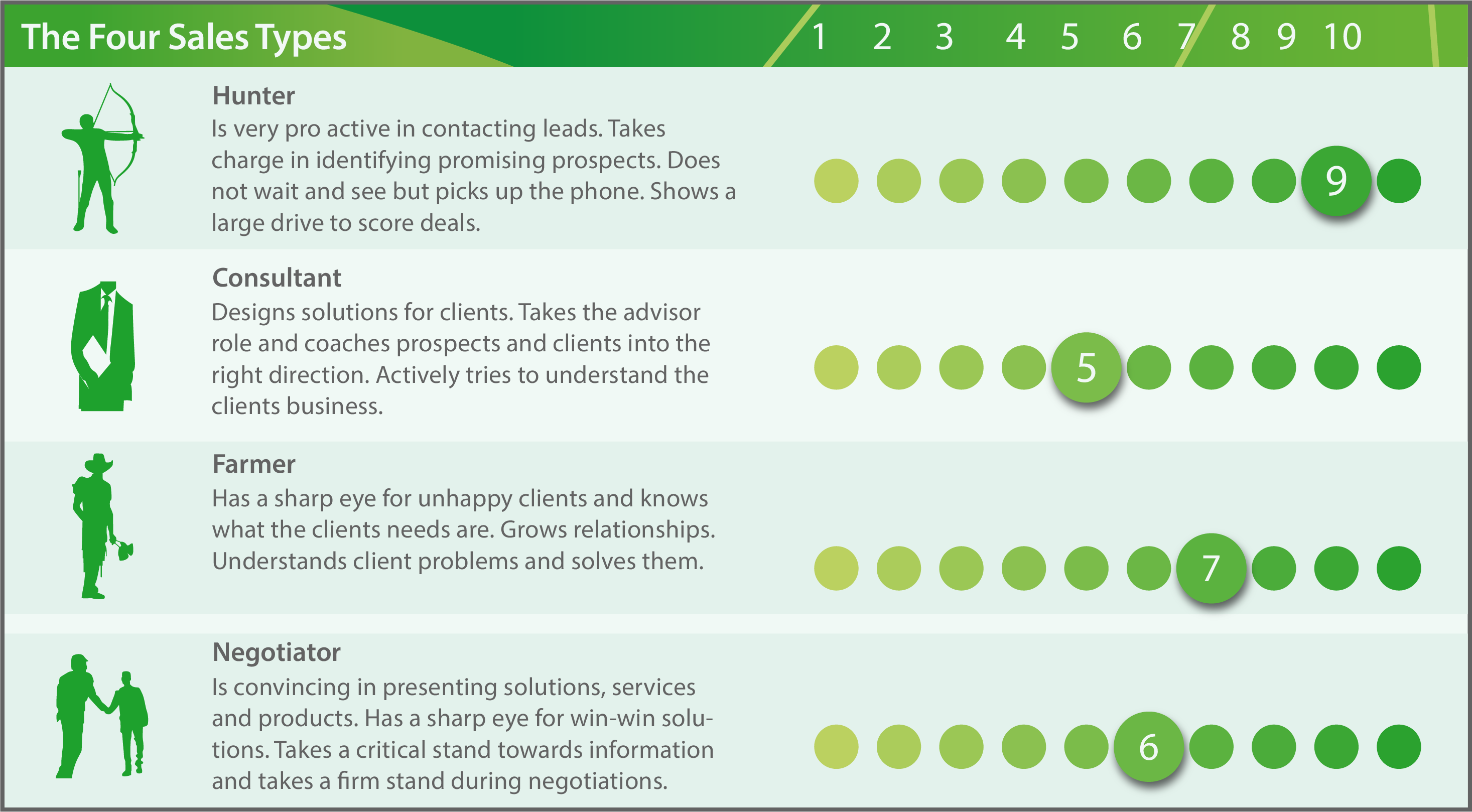Sales assessment: the Hunter type
TestGroup's sales assessment is the premier choice for evaluating sales talent in numerous countries around the globe. This powerful tool provides immediate insights into the commercial skills of your candidates or employees. Endorsed by industry experts, it is the preferred assessment for businesses aiming to hire top talent. You can conveniently order the sales assessment for each candidate or choose a cost-effective subscription plan to address your ongoing needs.
Participants take about 45 minutes to complete the assessment. You will receive two reports: the Sales Report, which highlights sales-specific strengths, and the Personality Report, providing insights into the candidate's traits and behaviors.
The online sales assessment provides an overview of a candidate's commercial strengths, potential risks, and suitability for sales roles. It includes scores for the six stages of the sales process and outlines four key sales types: Hunter, Farmer, Consultant, and Negotiator.

What is a Hunter sales type?
A Hunter sales type is a high-energy, results-driven salesperson focused on generating leads and closing deals quickly. Using a sales assessment helps businesses identify top-performing candidates for this dynamic role.
As the name suggests, Hunters in sales actively seek out prospects and focus on converting them into customers. These sales professionals are highly driven, often motivated by commission, and thrive when working independently. Many prefer autonomy and excel when given the freedom to manage their work.
Hunters possess the ability to quickly earn a prospect’s trust and close deals at a steady pace. However, they are less focused on cultivating long-term client relationships.
TestGroup's sales assessment is based on The Bridge Personality test, which evaluates 34 competencies associated with the Big Five model of personality. Eight of these competencies are crucial for selecting and developing a Hunter sales type:
Matching Bridge Personality competencies
Example page of the sales assessment report:

Sales employees with low scores (1-3) on the Hunter type:
Sales employees with high scores (8-10) on the Hunter type:
Skills that a Hunter can develop to improve sales:
To become better at hunting for new business during sales work, the following skills can be developed:
To make an excellent first impression, a hunter must demonstrate drive and enthusiasm. To accomplish this, hunters prioritize self-care and actively work to maintain their physical and mental fitness. A well-groomed appearance, a firm handshake, and an open posture will help the salesperson project confidence and self-assurance, creating a strong first impression.
By actively viewing themselves as the ideal salesperson and fostering a positive self-image, the salesperson can become a more effective Hunter. A natural Hunter always feels compelled to improve in sales overall and hunting in particular. Hunters strive to excel in their profession and work to enhance their skills each day. To achieve this, a proactive mindset is crucial. Setting attainable goals helps the Hunter focus on achievable results. Additionally, making the Hunter aware of competitors encourages them to be faster, more creative, and more focused. A Hunter enjoys competition and views sales as a game that must be won.
How to spot the Hunter sales type:
Typical responsibilities:
Potential job titles:
TestGroup's sales assessment
TestGroup's online sales assessment is a leading choice for evaluating sales talent globally. It provides instant insights into candidates' commercial skills and is trusted by experts across various industries. Ideal for businesses looking to hire top-tier talent, the assessment is available on a per-candidate basis or through a cost-effective subscription plan.
Managing the sales Hunter type
Hunters bring high energy and motivation to succeed. Allowing them to work independently is often the best approach to maximize their strengths.
To inspire hunters, it's effective to appeal to their competitive spirit and desire for success. Challenging sales quotas, healthy competition within the team, and performance-based incentives can help sustain engagement and productivity.
Hunters are known for seeking growth opportunities. If they perceive stagnation in their career, they are likely to move on to other organizations with greater potential. To encourage retention, ensure they remain challenged and motivated through opportunities that stretch their abilities.
Hunters view sales as a numbers game, aiming to connect with and convert as many leads as possible. Rejection and objections are seen as part of the process, not as setbacks.
Traits of a Hunter
Sales Hunters can be identified by the following key characteristics:
Activities Commonly Performed by Hunters
Hunters are often engaged in activities such as:
These activities align with the traditional expectations of a sales representative and showcase the core strengths of Hunters.
Pros and Cons of Sales Hunters
Sales Hunters bring significant value to any organization. Their drive to secure new business is essential for company growth, as no business can thrive without generating new revenue. Hunters often serve as the face of the brand, leveraging their charisma to create strong first impressions with potential clients.
However, a team comprised solely of Hunters may face challenges. Acquiring new customers is considerably more expensive than retaining existing ones, and even the most effective Hunters require substantial resources to succeed.
Hunters also tend to work independently and may not prioritize contributing to team culture. This independent streak can lead to a higher likelihood of leaving for better opportunities if their needs for growth and challenge are not met.
Recognizing a Sales Hunter
Identifying Hunters within a sales team is critical for building an effective workforce. Sales Hunters stand out due to their relentless pursuit of opportunities, innovative approaches, and passion for achieving success.
Key indicators of a sales Hunter include:
- Obsessive pursuit of opportunities: They are constantly prospecting, networking, and researching to expand their client base.
- Innovative problem solving: Hunters often devise creative strategies to overcome challenges and approach prospects uniquely.
- Passion for sales: Their enthusiasm for selling is evident in how they engage with both products and potential clients.
- Exceptional communication skills: Hunters excel in both written and verbal communication, delivering persuasive messages that captivate even skeptical prospects.
- Team influence: Their energy and drive often inspire others, creating a ripple effect that elevates team performance.
Building a Sales Team with Hunters
To effectively integrate Hunters into a team, a structured approach can be used:
With the right strategies, Hunters can become invaluable assets to any sales team, driving growth and success.
The Bridge Tests & Online Assessments
TestGroup is the official provider of the renowned Bridge tests and online assessments, which are high-quality, scientifically validated psychometric tools used globally. Developed in collaboration with universities around the world, these assessments predict workplace behavior through personality tests, cognitive ability evaluations, and career assessments. We assist organizations globally in using online assessments.















